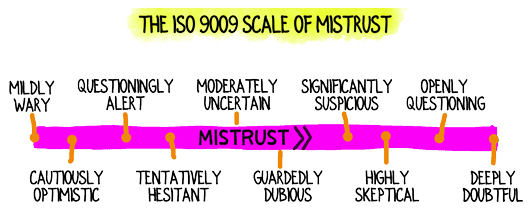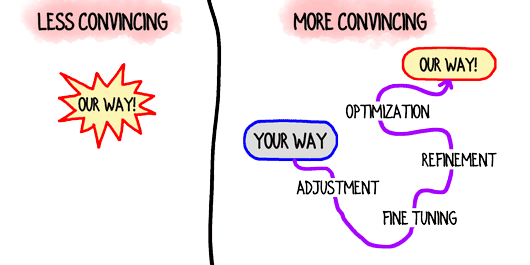Prospective clients need to hear certain messages from you in order for you to build a successful consulting firm. Are you sending the right signals?

Dulcinea Bious was crushed when she learned the truth.
Her parents, not the Tooth Fairy, placed Oreos under her pillow.
Sure, that particular wool dropped from her eyes 40 years ago. However, a series of trust-shaking revelations followed as the decades passed: hard work isn’t always recognized; hired hands (such as agencies and consulting firms) don’t always deliver promised outcomes; white chocolate’s identity is an existential debacle.
Hence, today, Dulcinea (“Du” to her friends) is consistently cautious.
She’s also the VP of Everything at Careful Co., and the very skeptical, prospective buyer of your consulting services. Drats!
Alas, many of your prospects are exactly like Du.
They want to believe that your consulting firm holds the solution to their problems. Just like they want to believe every new hire will perform beyond expectations, every speaker taking the stage at a conference will inspire them, and every child will eventually listen to reason.
In other words, prospective clients harbor endless reserves of hope.
However, their hope is tempered by years replete with disappointments. Prospects are scarred and suspicious, and their skepticism ranges from mildly wary to deeply doubtful.

Hence, Du remains undecided. Should she work with your consulting firm or turn you away?
Since uncertainty is paralyzing, Du searches for indicators that will point her confidently toward a decision. She’s alert to red flags that eliminate you from consideration. And, always carrying an ember of hope, she looks for Reasons to Believe that your consulting firm is the answer she seeks.
When you provide the right Reasons to Believe, your consulting firm will close engagements as a a hot knife slicing warm fudge.
Let’s look at how to communicate Reasons to Believe, starting with a couple of common mistakes, then a few best practices.
Common “Reasons to Believe” Mistakes
Touting Client Satisfaction
You have clients that love you. Terrific. Also, unconvincing. Every consulting firm has clients that love them, including the firms that previously disappointed Du.
Testimonials that emphasize how much your clients adore your consulting firm won’t impress Du.
Differentiating Primarily Versus Other Consulting Firms
Even when your prospects are considering other consulting firms, emphasizing your differences compared to competition will rarely win you the golden ring.
Du’s interest is in how you will overcome her obstacles, not how you are different from other firms.
Keys to Effective “Reasons to Believe”
Reference Prospects’ (Likely) Past
The most effective Reasons to Believe reveal:
- You deeply understanding the route prospects have tried in the past.
- You can explain why past attempts didn’t work.
- You have solid rationale for why a different path will achieve better results.

Deviate 20% From the Norm
Notwithstanding the need to separate your firm from tried-and-failed approaches, ensure your recommendation doesn’t diverge too far from Du’s existing beliefs.
Prospects assume they require only a small course-correction from their current understanding of the route to success, not a left turn or a complete turnabout.
You will trigger Du’s red flags if you present a major departure from her view of reality.
Highlight Relevant Expertise
The best Reason to Believe for Du is evidence you solved the exact same problem for another client exactly like Careful Co. Preferably yesterday.
Industry expertise and problem expertise fuel a powerful Reason to Believe. The more precisely you define your expertise, the more Du will trust your claims.
Provide Evidence of Results
Your catalog of concrete, pertinent outcomes works hand-in-hand with relevant expertise. While case studies are useful, nothing speaks louder than results-laden testimonials.
Let Du read or hear the highly successful results your other clients have enjoyed in those clients’ own words. (Including the client’s name increases believability.)
What about your consulting firm—what Reasons to Believe do you offer clients so that they see you as a credible, reliable solution to their challenge?
Text and images are © 2024 David A. Fields, all rights reserved.

 David A. Fields Consulting Group
David A. Fields Consulting Group 

Understand their issue. Getting them to focus on what it would be like to reach their ideal state, and identify some of the major gaps and obstacles currently in the way.
A clear picture of the possible future will definitely fuel a prospect’s desire to bring in a consultant, Praveen. And if you add solid Reasons to Believe in your firm in particular, that will help your sales process even further.
I’m very glad you joined the conversation, Praveen!
David, thanks for highlighting the “journey” that the customer has been on. We often speak of “meeting the client where they are”. It’s similar but I like the detail you have described.
Well said, Chuck. Meeting a client where they are is a very Right-Side Up philosophy. I’m glad you connected those dots and shared your reaction!
Can you help explain the difference between these two statements?
Testimonials that emphasize how much your clients adore your consulting firm won’t impress Du.
vs.
While case studies are useful, nothing speaks louder than results-laden testimonials.
Thanks!
Great question Brad. It’s all about the content of the testimonials.
Too many testimonials are fluffy praise of the consulting firm, along the lines of “Working with XYZ associates was great and they are extremely responsive.” That doesn’t create a meaningful Reason to Believe. On the other hand, a results-laden testimonial sounds like, “Thanks to XYZ’s support, our attrition rate dropped 35%, we closed four deals we wouldn’t have won otherwise, and were we able to double our chocolate intake.”
Praise is nice. Results overcome doubt.
Thanks for digging deep into the topic, Brad!
So, David, are we to leave all the other building blocks of our marketing assets in the dust bin? Or just lead with this messaging on top of everything else we have so meticulously crafted? Daniel Priestley preaches the new 7/11/4 approach to thought leadership on your way to becoming a Key Person of Influence. Pretty powerful mindshift away from SEO as the miracle drug to cure all ills.
Wouldn’t it be nice if we had a miracle drug for building consulting firms, Trow? You absolutely will benefit from a consistent, well-developed, well-executed marketing effort. Marketing creates leads. Reasons to Believe enable more effective marketing and also help you convert those leads into clients.
I haven’t seen the 7/11/4 approach as being necessary in consulting; however, you certainly won’t go wrong by creating a broad and deep visibility-building effort!
I appreciate your question, Trow.
Interesting! And, pardon my ignorance, but, what is the 7/11/4 approach? Also, what is SEO?
In advance, thanks for clarification.
Mallory, the 7/11/4 approach is based on research that suggests a buyer needs 7 hours of interaction across 11 touch points in 4 separate locations before they make a purchase. I haven’t found it translates directly to consulting; however, it sparks good thinking.
SEO is search engine optimization, though it’s often used as a catchall term for digital marketing, social media marketing, digital advertising, etc. Overall, those tactics should be near the bottom of your list of marketing tactics.
Good on you for asking, Mallory!